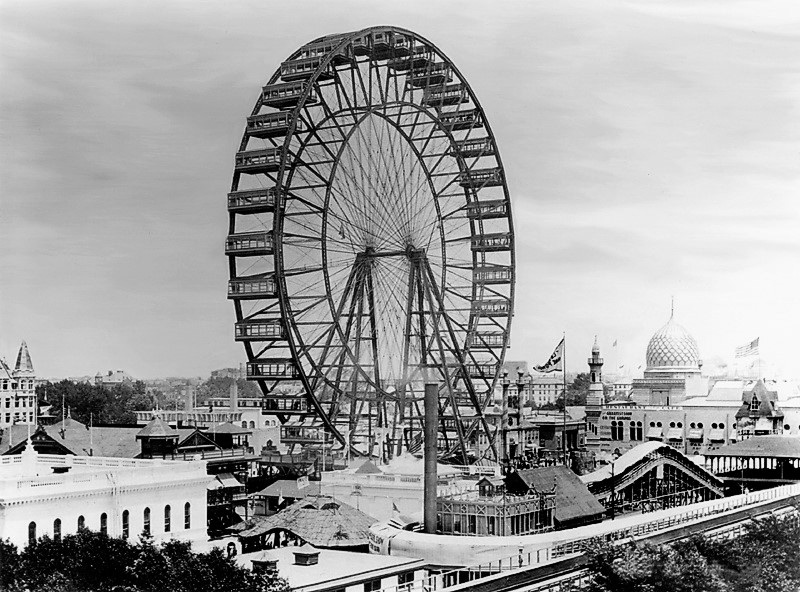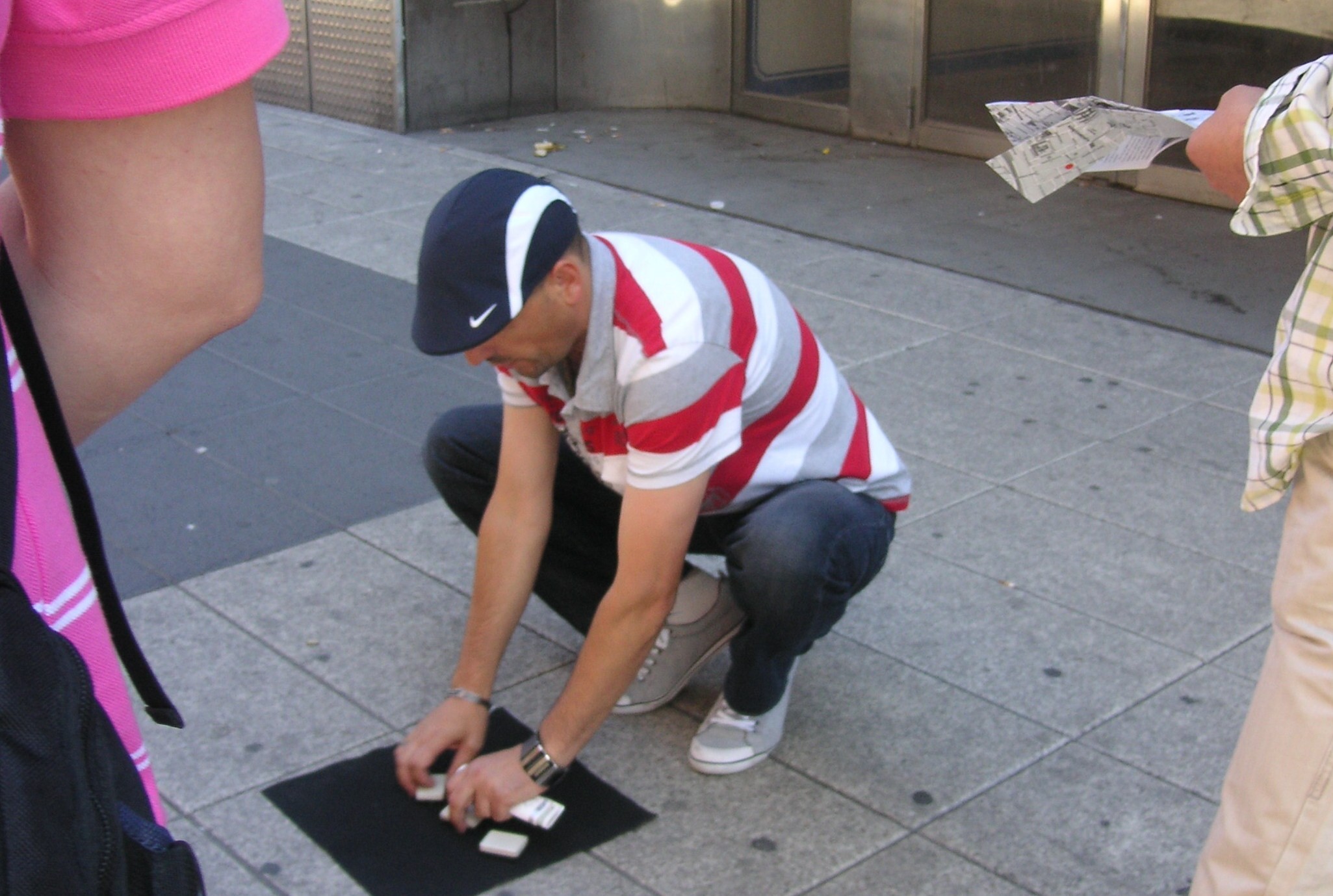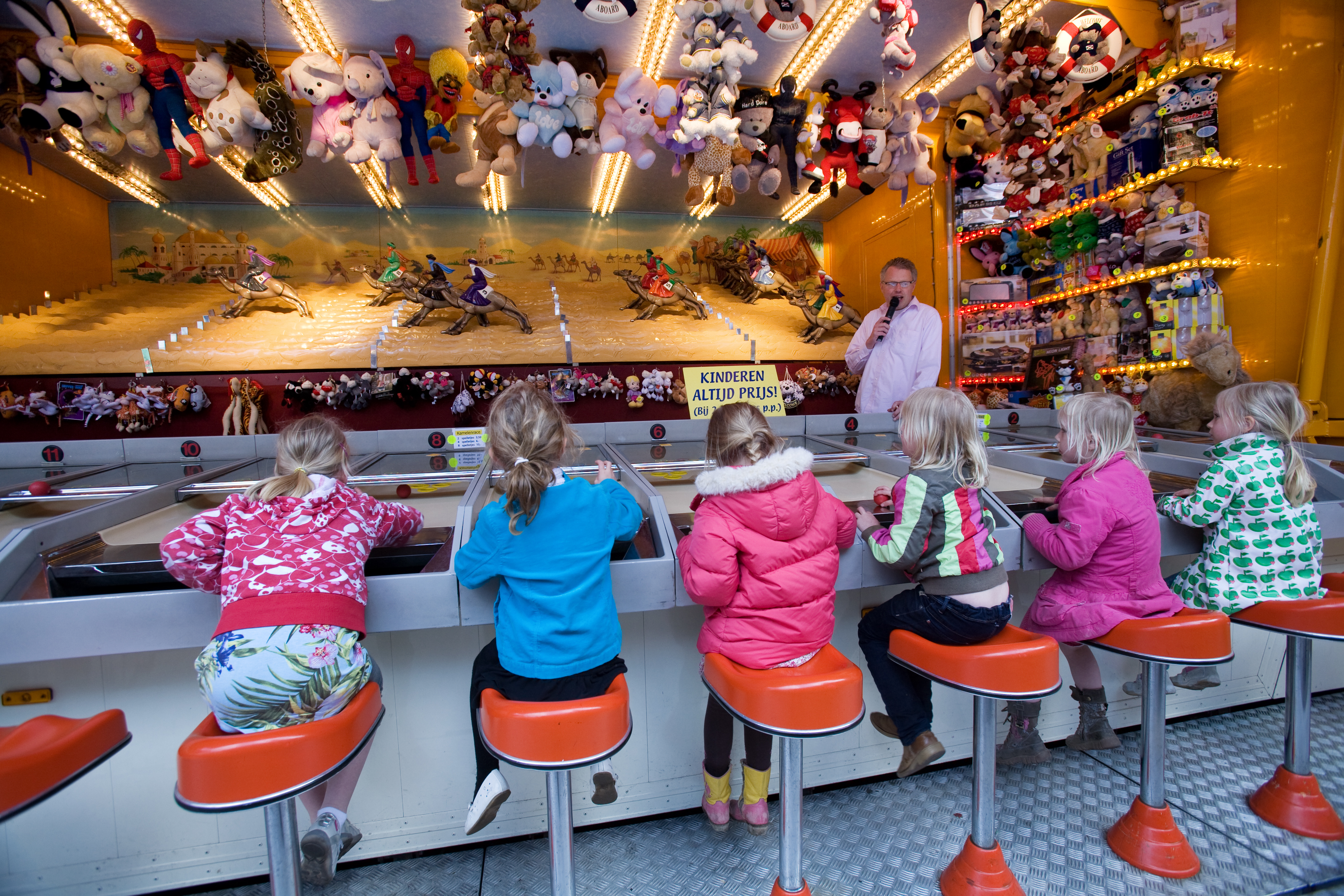|
Midway (fair)
A game of popping balloons with darts for prizes—a common part of a carnival or fair midway A midway at a fair (commonly an American fair such as a county or state fair) is the location where carnival games, amusement rides, entertainment, dime stores, themed events, exhibitions and trade shows, pleasure gardens, water parks and food booths cluster. The midway is located between the entrance and the big top of a circus; thus, a carnival is essentially a travelling midway. Origin The term originated from the World's Columbian Exposition held in Chicago, Illinois, in 1893. It was the first world's fair with an area for amusements which was strictly separated from the exhibition halls. This area, which was concentrated on the city's Midway Plaisance created for the Exposition, included amusement rides (among them the original Ferris Wheel), belly dancers, balloon rides, concession stands, and other attractions. After the Exposition, the term ''midway'' came into u ... [...More Info...] [...Related Items...] OR: [Wikipedia] [Google] [Baidu] |
Fair Employee At Balloon Game
A fair (archaic: faire or fayre) is a gathering of people for a variety of entertainment or commercial activities. Fairs are typically temporary with scheduled times lasting from an afternoon to several weeks. Fairs showcase a wide range of goods, products, and services, and often include competitions, exhibitions, and educational activities. Fairs can be thematic, focusing on specific industries or interests. Types Variations of fairs include: * Art fairs, including art exhibitions and arts festivals * Book Fairs in communities and schools provide an opportunity for readers, writers, publishers to come together and celebrate literature. * County fair (US) or county show (UK), a public agricultural show exhibiting the equipment, animals, sports and recreation associated with agriculture and animal husbandry. * Festival, an event ordinarily coordinated with a theme e.g. music, art, season, tradition, history, ethnicity, religion, or a national holiday. * Health fair, an event ... [...More Info...] [...Related Items...] OR: [Wikipedia] [Google] [Baidu] |
Amusement Park
An amusement park is a park that features various attractions, such as rides and games, and events for entertainment purposes. A theme park is a type of amusement park that bases its structures and attractions around a central theme, often featuring multiple areas with different themes. Unlike temporary and mobile Travelling funfair, funfairs and traveling carnival, carnivals, amusement parks are stationary and built for long-lasting operation. They are more elaborate than Urban park, city parks and playgrounds, usually providing attractions that cater to a variety of age groups. While amusement parks often contain themed areas, theme parks place a heavier focus with more intricately designed themes that revolve around a particular subject or group of subjects. Amusement parks evolved from European fairs, pleasure gardens, and large Picnic, picnic areas, which were created for people's recreation. World's fairs and other types of international expositions also influenced the em ... [...More Info...] [...Related Items...] OR: [Wikipedia] [Google] [Baidu] |
Ferris Wheel
A Ferris wheel (also called a big wheel, giant wheel or an observation wheel) is an amusement ride consisting of a rotating upright wheel with multiple passenger-carrying components (commonly referred to as passenger cars, cabins, tubs, gondolas, capsules, or pods) attached to the Rim (wheel), rim in such a way that as the wheel turns, they are kept upright, usually by gravity. Some of the largest modern Ferris wheels have cars mounted on the outside of the rim, with electric motors to independently rotate each car to keep it upright. Some of the largest modern Ferris wheels have cars mounted on the outside of the rim, with electric motors to independently rotate each car to keep it upright. The Ferris Wheel (1893), original Ferris Wheel was designed and constructed by George Washington Gale Ferris Jr. as a landmark for the 1893 World's Columbian Exposition in Chicago; although much smaller wooden wheels of similar idea predate Ferris's wheel, dating perhaps to the 1500s. The ge ... [...More Info...] [...Related Items...] OR: [Wikipedia] [Google] [Baidu] |
List Of Amusement Rides
Amusement rides, sometimes called carnival rides, are mechanical devices or structures that move people to create fun and enjoyment. Rides are often perceived by many as being scary or more dangerous than they actually are. This could be due to the design, having acrophobia, or from hearing about accidents involving rides that are similar. For some, the adrenaline associated with riding amusement rides is part of the experience. They are common at most annual events such as fairs, traveling carnivals, and circuses around the world. Sometimes music festivals and concerts also host amusement park rides. Types of rides * Flat rides are usually those that move their passengers on a plane generally parallel to the ground, such as rides that spin around a vertical axis, like carousels and twists; and ground-level rides such as bumper cars. The term is also used to refer to amusement rides that are not classified as dark rides, rollercoasters, transport rides, or water rides. ... [...More Info...] [...Related Items...] OR: [Wikipedia] [Google] [Baidu] |
Shell Game
The shell game (also known as thimblerig, three shells and a pea, the old army game) is a public gambling game that challenges players to follow the movement of a marker hidden under one of several covers (shells). In practice, the game is almost always run as a confidence trick that uses sleight of hand to transfer the marker between covers. In confidence trick slang, this swindle is referred to as a ''short-con'' because it is quick and easy to pull off. The shell game is related to the cups and balls conjuring trick, which is performed purely for entertainment purposes without any purported gambling element. Play In the shell game, three or more identical containers (which may be cups, shells, bottle caps, or anything else) are placed face-down on a surface. A small ball is placed beneath one of these containers so that it cannot be seen, and they are then shuffled by the operator in plain view. One or more players are invited to bet on which container holds the ball – ty ... [...More Info...] [...Related Items...] OR: [Wikipedia] [Google] [Baidu] |
Game Of Chance
A game of chance is in contrast with a game of skill. It is a game whose outcome is strongly influenced by some randomizing device. Common devices used include dice, spinning tops, playing cards, roulette wheels, numbered balls, or in the case of digital games random number generators. A game of chance may be played as gambling if players wager money or anything of monetary value. Alternatively, a game of skill is one in which the outcome is determined mainly by mental or physical skill, rather than chance. While a game of chance may have some skill element to it, chance generally plays a greater role in determining its outcome. A game of skill may also may have elements of chance, but skill plays a greater role in determining its outcome. Gambling is known in nearly all human societies, even though many have passed laws restricting it. Early people used the knucklebones of sheep as dice. Some people develop a psychological addiction to gambling and will risk food and sh ... [...More Info...] [...Related Items...] OR: [Wikipedia] [Google] [Baidu] |
Game Of Skill
A game of skill is a game where the outcome is determined mainly by mental or physical skill, rather than chance. Alternatively, a game of chance is one where its outcome is strongly influenced by some randomizing device, such as dice, spinning tops, playing cards, roulette wheels, or numbered balls drawn from a container. While a game of chance may have some skill element to it, chance generally plays a greater role in determining its outcome. A game of skill may also have elements of chance, but skill plays a greater role in determining its outcome. Some commonly played games of skill and chance include: poker, collectible card games, contract bridge, backgammon and mahjong. Most games of skill also involve a degree of chance, due to natural aspects of the environment, a randomizing device (such as dice, playing cards or a coin flip), or guessing due to incomplete information. For many games where skill is a component alongside chance, such as card games like poker ... [...More Info...] [...Related Items...] OR: [Wikipedia] [Google] [Baidu] |
Carnival Game
A carnival game is a game of chance or game of skill, skill that can be seen at a traveling carnival, charity fund raiser, amusement arcade and amusement park, or on a State fair, state and county fairs, county fair midway (fair), midway. They are also commonly played on holidays such as Mardi Gras, Saint Patrick's Day, and Oktoberfest. Carnival games are usually operated on a "pay per play" basis. Prices may range from a small amount, for example 25 Cent (currency), cents, to a few dollars per play. Most games offer a small prize to the winner. Prizes may include items like stuffed animals, toys, or posters. Continued play is encouraged as multiple small prizes may be traded in for a larger prize. Multiplayer games — the "Watergun" game is one example—may change the size of the prize with the number of players. In a more difficult game, including the "Baseball and Basket" or "Stand the Bottle", a large prize may be awarded to any winner. Carnival games have a poor reputation ... [...More Info...] [...Related Items...] OR: [Wikipedia] [Google] [Baidu] |
Amusement Park
An amusement park is a park that features various attractions, such as rides and games, and events for entertainment purposes. A theme park is a type of amusement park that bases its structures and attractions around a central theme, often featuring multiple areas with different themes. Unlike temporary and mobile Travelling funfair, funfairs and traveling carnival, carnivals, amusement parks are stationary and built for long-lasting operation. They are more elaborate than Urban park, city parks and playgrounds, usually providing attractions that cater to a variety of age groups. While amusement parks often contain themed areas, theme parks place a heavier focus with more intricately designed themes that revolve around a particular subject or group of subjects. Amusement parks evolved from European fairs, pleasure gardens, and large Picnic, picnic areas, which were created for people's recreation. World's fairs and other types of international expositions also influenced the em ... [...More Info...] [...Related Items...] OR: [Wikipedia] [Google] [Baidu] |
Festival
A festival is an event celebrated by a community and centering on some characteristic aspect or aspects of that community and its religion or cultures. It is often marked as a local or national holiday, Melā, mela, or Muslim holidays, eid. A festival constitutes typical cases of glocalization, as well as the high culture-low culture interrelationship. Next to religion and folklore, a significant origin is agriculture, agricultural. Food is such a vital resource that many festivals are associated with harvest time. Religious commemoration and thanksgiving for good harvests are blended in events that take place in autumn, such as Halloween in the northern hemisphere and Easter in the southern. Festivals often serve to fulfill specific communal purposes, especially in regard to commemoration or thanking to the gods, goddesses or saints: they are called patronal festivals. They may also provide entertainment, which was particularly important to local communities before the adven ... [...More Info...] [...Related Items...] OR: [Wikipedia] [Google] [Baidu] |
Concession Stand
A concession stand, or refreshment stand (American English, Canadian English), snack kiosk or snack bar (British English, Irish English) is a place where patrons can purchase snacks or food at a cinema, amusement park, zoo, aquarium, circus, fair, stadium, beach, swimming pool, concert, sporting event, or other entertainment venue. Some events or venues contract the right to sell food to third parties. Those contracts are often referred to as a concession, hence the name for a stand where food is sold. Usually prices for goods at concession stands are greater than elsewhere for the convenience of being close to an attraction and thus often contribute significant revenue to the venue operator (especially in the case of movie theaters). Additionally, outside food and drink is often prohibited to incentivise spending at the concession stands. History Concession stands were not originally operated by the movie theaters, and food was often sold by people attending the film or by ... [...More Info...] [...Related Items...] OR: [Wikipedia] [Google] [Baidu] |








